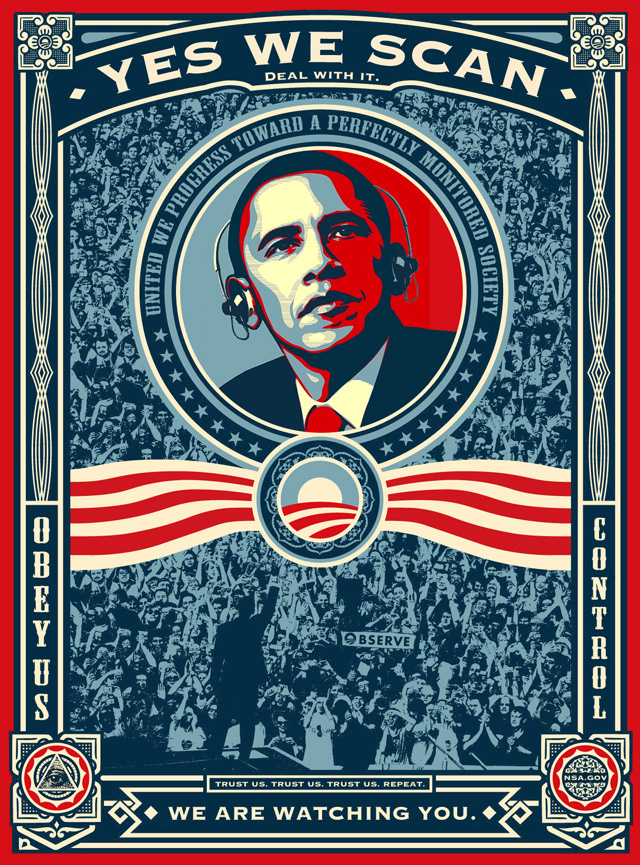Global elite shapes flow of information through intimidation of journalists
Kurt Nimmo
Infowars.com
November 12, 2013
 The Stasi surveillance state, exemplified by NSA snooping, has very little if anything to do with terrorists. Like all apparatuses of the totalitarian state, panopticon surveillance focuses on protecting and maintaining the national security state’s monopoly of political power. Police state surveillance is designed to facilitate the early discovery of opposition and decisively eliminate it before substantive change or reform occurs.
The Stasi surveillance state, exemplified by NSA snooping, has very little if anything to do with terrorists. Like all apparatuses of the totalitarian state, panopticon surveillance focuses on protecting and maintaining the national security state’s monopoly of political power. Police state surveillance is designed to facilitate the early discovery of opposition and decisively eliminate it before substantive change or reform occurs.
In addition to eliminating political opposition — the Occupy Wall Street movement serves as a prime example — the Stasi state is designed to intimidate and moderate expressions of political opinion.
It can be persuasively argued this is the reason the establishment media obsessively dwells on the NSA story and its associated memes. The establishment media consistently portrays former NSA analyst Edward Snowden in a negative light and characterizes him as a “leaker” of state secrets. This narrative and a deluge of revelations about the depth and severity of government surveillance have produced behavior on the part of journalists and others previously observed in communist and socialist authoritarian states.
“The question of the harms caused by widespread surveillance in democracies, like the surveillance being conducted by the U.S. National Security Agency, is underexplored,” explains PEN America, an organization dedicated to freedom of expression. A survey conducted recently by the group and published in a paper titled Chilling Effects: NSA Surveillance Drives U.S. Writers to Self-Censor reveals that 85% of writers “are worried about government surveillance of Americans, and 73% of writers have never been as worried about privacy rights and freedom of the press as they are today.”
According to the survey, writers and journalists are reluctant to research and write about the American Stasi state apparatus and controversial political topics. “I have felt that even to comment on the Snowden case in an email would flag my email as worthy of being looked at,” one respondent said. “I have made a conscious, deliberate choice to avoid certain conversation topics in electronic emails out of concern that those communications may be surveilled,” said another.
The current atmosphere, according to one respondent, is reminiscent of the repressive climate prevalent in the former Soviet Union. Certain precautions by writers today “remind me of my days as Moscow Bureau Chief of [a major news outlet] under Communism, when to communicate with dissidents and refuseniks we had to avoid substantive phone conversations, meet in person in public, etc. It’s not a good feeling to have reporters’ work in your own country’s capital resemble ours in Moscow in the bad old days.”
Private conversation in the public space to avoid telephone eavesdropping may have worked in the “bad old days” of the Soviet Union, but surveillance technology now makes this nearly impossible in America, as Infowars reported on Monday. “The ability to record street conversations is merely one special feature of the Intellistreets lighting system, which is linked back to a central data hub via a ubiquitous wi-fi connection,” writes Paul Joseph Watson. “The ‘smart’ street lights can also act as surveillance cameras, make loudspeaker security announcements (See Something, Say Something), as well as track ‘RFID equipped staff,’ which could be any of us given the increasing amount of clothing and products which are RFID tagged.”
PEN has called on the government “to take immediate steps to restore public confidence that private communications remain private and protected,” a call that will naturally fall on deaf ears. Sen. Dianne Feinstein, the chairman of the Senate Intelligence Committee, and other members of Congress stand behind the ongoing effort by the NSA to fully implement a Stasi state surveillance panopticon.
In response to public outrage, Feinstein, the intelligence committees, and members of Congress have put forth legislation designed to “paint a veneer of transparency over still deeply secret programs,” reports the Electronic Frontier Foundation. Congress is busily at work constructing what amounts to a “NSA entrenchment bill,” not serious reform of police state surveillance. Congress is certainly not following its oath to defend and protect the Constitution.
Inculcating fear and cowing an independent intelligentsia is high on the to-do list of the national security state. Short of establishing an American version of Glavlit, the Soviet arm of administrative censorship imposed on the press, the ruling globalist elite are moving to shape the flow of information in part through intimidation of journalists by creating an atmosphere of fear and suspicion.
The Emergency Election Sale is now live! Get 30% to 60% off our most popular products today!



